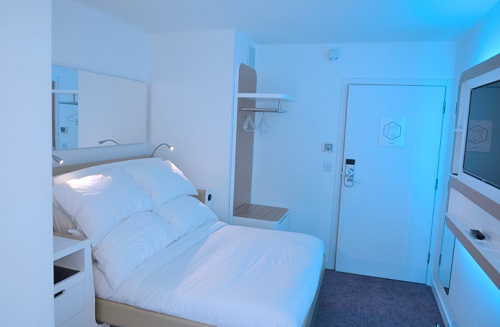✕

Column: industry Tag: Yotel,Yotel hotel Published: 2017-03-09 11:20 Source: Author:

Armed with a new room design for its ambitious pipeline of city-center hotels, the midscale Yotel hotel brand is targeting a platform of global diversification complemented by its established airport assets.
Yotel’s only urban property open is in New York City, which has 669 rooms and opened in 2011. Hotels are under construction in Boston and Singapore, cities that represent the urban growth that Yotel CEO Hubert Viriot anticipates will fuel the company’s expansion. Viriot spoke with Hotel News Now at the brand’s London headquarters.
“The New York property has not seen occupancy below 90%,” Viriot said, who added the goal of the company was to have 50 properties by 2020, mostly via hotel management agreements in properties that are “efficient, cool, well-priced experiences.”
Yotel has four airport hotels, two in the United Kingdom—at London Heathrow and London Gatwick—one in France at Paris Charles de Gaulle and one in The Netherlands at Amsterdam Schiphol.
Viriot said Yotel’s expansion plan is ambitious.
“The plan is now coming live. We shall have three openings in 2017, in Boston in July with 326 rooms, then 610 rooms in Singapore and 202 in San Francisco in the autumn,” he said.
“These are not just targets,” Viriot added. “As an organization, they have huge implications, as keys will be under our management, including 100% of those three properties. Yes, we started from a low base, but that key count is still a lot to absorb.”
Viriot said properties will have low numbers of local staff, with administration being conducted from London. Assets in new destinations, for example, the Singapore hotel, will act as regional headquarter locations as the company continues to expand.
The majority stakeholder in Yotel is Kuwait-based IFA Hotels & Resorts.
“We have a big challenge ahead of us,” Viriot said. “It is a year in which we’re completing the platform, building the team, recruiting management, introducing (standard operating procedures) and making sure budgets are met. We’ll have new eyes around the world, which will attract further investment.”
“We want to create entrepreneurial spirit, but we do not want to create a beast,” he added.
Viriot said upcoming city center destinations include San Francisco, London, Brooklyn, Miami and Dubai, where two properties are in discussion.
A London property, in the Clerkenwell neighborhood, will open in 2018. It will have 212 keys. Construction has started on what Viriot calls “a big milestone” for Yotel.
Yotel is not forgetting its airport properties, though, with two more planned.
A very good scenario for Yotel, Viriot said, is to be in cities where an airport Yotel can complement a city-center Yotel, and vice-versa, and to this extent he said the company hopes to sign urban locations in Amsterdam and Paris in 2017 for Amsterdam and Paris. Other Western European cities are next on that target list.
Corporate credo
Viriot said corporate business will play a role in Yotel’s next expansion phase. Currently, approximately 30% of demand comes from corporate groups, and that while online travel agencies are “useful,” the drive to fill rooms comes from in-house sales and marketing.
“Getting direct web traffic is as good as the cash you spend on it. It’s a revenue and cost game,” Viriot said.
As a globally growing hotel management company, Yotel is investing “significant capital on sales and marketing and in its corporate account base,” particularly on the property level, Viriot added. The company also recently launched a loyalty program, also targeting corporate travelers.
For its airport-hotel business, Viriot said those properties always require a different operating model, driven via a concession model in partnership with airport authorities.
Regions also dictate how the brand might expand. “In Europe, franchises can jeopardize the whole brand, and while (Europeans) understand (hotel management agreements), they just refuse to do them,” Viriot said.
Viriot pointed to Sydney as an exciting market but one in which the residential asset class often is dominant.
“And when (investors) are hooked on residential returns, it’s hard to stop,” Viriot said.
Room refresh
Rohan Thakkar, senior manager of development and strategy, said the brand’s new room “premium” format is earmarked for 80% of Yotel’s current portfolio and future footprint.
The remaining 20% or so, a percentage that will change up or down slightly from each hotel, depending on the building and location, will be larger, allowing Yotel to diversify product, increase average daily rate and attract a more diversified corporate business, Thakkar said.
New design traits include making the entries to rooms wider for an immediate sense of space and then narrowing to floor-to-ceiling windows.
“We’ll continue to have a desk, but one that pulls out,” Thakkar said, who added that business travelers benefit from booth areas in public spaces as well.
The company is experimenting with room light and color as well, Thakkar said, citing research that shows orange is the best color to help guests wind down.
Viriot said the hotel industry has reason to want to be calmer, too.
Brexit and what might be its effect on reducing language skills in U.K. hotels was one worry, Viriot said.
“Our costs are in pounds (sterling), but our revenue is in euros and (U.S.) dollars,” Viriot said, speaking of Yotel’s business base being in London.
“The idea of setting up in the Cayman Islands or the British Virgin Islands today for tax purposes is rather a no-go, so you just have to make sure your business is the most efficient it can be,” Viriot added.
Previous:Sandals to launch new tour operator in UK
Next:Dusit Thani Wetland Park Resort Nanjing set for late 2017 opening
Hot key words
Hot Products
Popular Vendors